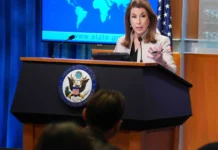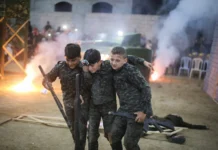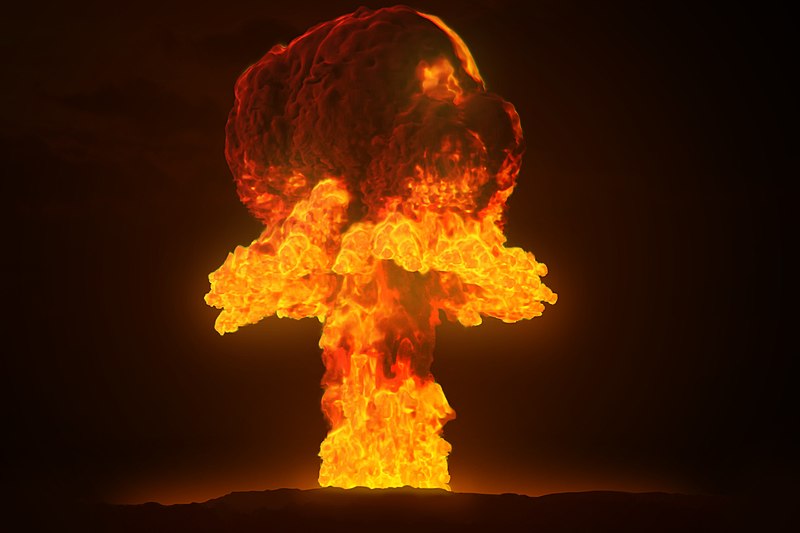“Recent events in Syria underscore the changing geo-strategic landscape in the Middle East. For Israel, though the fall of Assad will likely weaken Iran, it won’t necessarily reduce the risk of a nuclear war in the region. To wit, there is apt to take place a strengthening of certain Sunni sub-state jihadist elements, a development that could prove “force-multiplying” with a non-nuclear Turkey and/or an already-nuclear non-Arab Pakistan. Plausible “wild cards” in this opaque mix would be an increasingly desperate pre-nuclear Iran and an expectedly perplexed non-nuclear Saudi Arabia. Also to be factored in should be the unpredictable element of already-nuclear Iranian ally North Korea and its potentially critical connections to Vladimir Putin’s Russia. In essence, even a newly-weakened and still pre-nuclear Iran could pose existential hazards to Israel by means of North Korean military surrogates.”
Abstract: Swiss playwright Friedrich Durrenmatt warns: “The worst does sometime happen.” For Israel, “the worst” would be nuclear war against an already-nuclear adversary. Less catastrophic, prima facie, would be a nuclear war with a not-yet-nuclear adversary. But even a still pre-nuclear Iran – Israel’s most conspicuously existential foe – could produce unprecedented harms. To prepare themselves for all plausible nuclear conflict possibilities, Israeli strategic planners should examine pertinent narratives involving (1) nuclear retaliation; (2) nuclear counter-retaliation; (3) nuclear preemption; and (4) nuclear war fighting. Such examinations ought to be comprehensive, systematic and dialectical. They should also account for variously predictable narrative interactions and the estimated likelihood of enemy irrationality.
In the final analysis, Israel’s nuclear weapons and doctrine should ensure national survival. In the early 1950s, David Ben-Gurion, Israel’s first prime minister, already understood the need for a conspicuous “equalizer” to secure an otherwise too-vulnerable Jewish State. Early on, the “old man” had recognized that in the absence of task-appropriate nuclear assets, Israel could sometime lose every tangible chance to simply endure.
Still, no category of weapons, even nuclear ordnance, is meaningful per se. All weapon systems need to be informed by suitable strategy and tactics. How should these special Israeli assets be “used?”
Back in the early days, when Americans and Soviets were first defining a bipolar Cold War nuclear strategy ex nihilo, Israel had nowhere to turn for a template of useful guidance. What Jerusalem did understand, from the start, is that nuclear ordnance can succeed only through non-use. This seeming paradox has prominent conceptual origins in Sun Tzu’s ancient dictum from The Art of War: “Subjugating the enemy’s army without fighting is the true pinnacle of excellence.”
Sun Tzu’s timeless dictum is really just another way of describing military deterrence in general. This is a longstanding and generic national security posture by which specified kinds of adversaries can be more-or-less reliably discouraged from striking first. In brief, deterrence, whether ancient or contemporary, “works” to the extent that prospective aggressors could calculate that the expected costs of striking first would exceed expected gains.
To work, designated adversaries must be considered rational nation-states. Sometimes, these states could operate in tandem with other states (an alliance) or with assorted terror groups (hybrid). In the future, moreover, Israel’s enemies could include sub-state nuclear foes acting by themselves; to wit, Hezbollah, after it had become the recipient of reassuring nuclear largesse from Iran or even North Korea.
For now, at least, Israel has no already nuclear enemies, unless one were to consider Pakistan. This fully nuclear Islamic state. potentially subject to coup d’état by Jihadist elements, is closely aligned with Saudi Arabia. Presently, Iran leads a widening array of heavily armed Shiite proxies and militias. For relevant example, Tehran supplies missiles to Yemen’s Houthi Ansar al-Allah Shiite army, which then fires them at Saudi cities.
Despite a common enemy in Israel, the conflict between radical Shiite and Sunni forces continues across the region. For all sides, the aim of this conflict is “escalation dominance” during episodes of competitive risk-taking. Over time, such escalations by Iran could include nuclear warheads, not against insurgent targets, but against a formidable Arab state such as Saudi Arabia.
As a literal matter of survival, Israel should be intellectually creative and conceptually well-prepared. For deterrence to work long-term, Iran and its proxies would need to be told more rather than less about (1) Israel’s nuclear targeting doctrine; and (2) the expected invulnerability and penetration-capability of Israel’s nuclear forces. However counter-intuitive, this means that to best prepare for all plausible attack scenarios, Israel should plan conscientiously for the incremental replacement of “deliberate nuclear ambiguity” with apt levels of “selective nuclear disclosure.” In common parlance, it will soon be time for Jerusalem to remove Israel’s bomb from the “basement.”
For Israel, the only continuously true purpose of nuclear weapons should be deterrence ex ante, not revenge ex post. Nonetheless, there would inevitably remain diverse circumstances under which Israeli nuclear deterrence could fail. This means, ipso facto, situations of belligerent firings.
How might such fearful circumstances arise? Four principal though not mutually exclusive scenarios now warrant both mention and examination. Israel’s strategic planners should study these paradigmatic narratives closely, and prepare to deal effectively with any and all of them, singly and in potentially synergistic interactions.
There is more. Very soon, Israel’s military planners should begin to fashion similarly guiding narratives involving significant non-state adversaries, both Sunni and Shiite. More precisely, it could sometimes also be necessary for Israel to “choose sides” in these bewildering matters, thus (by strategic intention) lining up alongside with one Israeli adversary against another. In this connection, of course, special attention would need to be directed toward assessing and thwarting adversarial opportunities to “go nuclear.”
Taken together with the four basic scenarios outlined below, these “parallel” narratives could help provide Israel with needed intellectual armaments to prevent “the worst.” Presently, though Israel need not worry about any existing regional nuclear adversary, state or sub-state, it’s nuclear weapons and doctrine could still represent an indispensable “ultimate” deterrent against forms of massive conventional/biological/chemical attack.
(1) Nuclear Retaliation
Should Iran or an alliance of enemy states ever launch a nuclear first-strike against Israel (in principle, this could include North Korea), Jerusalem would respond to the extent possible with a nuclear retaliatory strike. If enemy first-strikes were to involve other available forms of unconventional weapons, such as chemical, biological or EMP (electromagnetic pulse) weapons, Israel might still launch a “limited” nuclear reprisal.[1] This decision would depend, in large measure, on Jerusalem’s informed expectations of follow-on enemy aggression and its comparative calculations of damage-limitation.
If Israel were to absorb a massively disruptive non-nuclear attack, a nuclear retaliation could not automatically be ruled out, especially if: (a) the state aggressors were perceived to hold nuclear and/or other unconventional weapons in reserve; and/or (b) Israel’s leaders were to believe that non-nuclear retaliations could not prevent annihilation of the Jewish State. A nuclear retaliation by Israel could be ruled out only in those rapidly discernible circumstances where enemy state aggressions were clearly conventional, “typical” (that is, consistent with all previous instances of attack, in degree and intent) and hard-target oriented (that is, directed towards Israeli weapons and related military infrastructures, rather than civilian populations).
(2) Nuclear Counter retaliation
Should Israel ever feel compelled to preempt enemy state aggression with conventional weapons, the target state(s)’ response would largely determine Jerusalem’s next moves. If this response were in any way nuclear, Israel would doubtlessly turn to some available form of nuclear counter retaliation. If this retaliation were to involve other non-nuclear weapons of mass destruction, Israel could also feel pressed to take the escalatory initiative. Again, this decision would depend upon Jerusalem’s judgments of enemy intent and on its corollary calculations of damage-limitation.
Should the enemy state response to Israel’s preemption be limited to hard-target conventional strikes, it is unlikely that the Jewish State would then move to any nuclear counter retaliations. If, however, the enemy conventional retaliation was “all-out” and directed toward Israeli civilian populations as well as Israeli military targets, an Israeli nuclear counter retaliation could not be excluded. Such a counter retaliation could be ruled out only if the enemy state’s conventional retaliation were identifiably proportionate to Israel’s preemption; confined to Israeli military targets; circumscribed by the legal limits of “military necessity;” and accompanied by certain explicit and verifiable assurances of non-escalatory intent.
(3) Nuclear Preemption
It is highly implausible that Israel would ever decide to launch a preemptive nuclear strike. Although circumstances could arise wherein such a strike would be rational and permissible under authoritative international law, it is unlikely that Israel would allow itself to reach such irremediably dire circumstances. Unless the nuclear weapons involved were usable in a fashion still consistent with the longstanding laws of war, this most extreme form of preemption could represent an expressly egregious violation of humanitarian international law.
Even if such consistency were possible, the psychological/political impact on the entire world community would be strongly negative and significantly far-reaching. This means that an Israeli nuclear preemption could conceivably be expected only: (a) where Israel’s pertinent state enemies had acquired nuclear and/or other weapons of mass destruction judged capable of annihilating the Jewish State; (b) where these enemies had made it clear that their intentions paralleled their genocidal capabilities; (c) where these enemies were believed ready to begin an operational “countdown to launch;” and (d) where Jerusalem believed that Israeli non-nuclear preemptions could not achieve the needed minimum levels of damage-limitation – that is, levels consistent with physical preservation of the Jewish State.
(4) Nuclear War fighting
Should nuclear weapons ever be introduced into any actual conflict between Israel and its enemies, either by Israel or a regional foe, nuclear war fighting, at one level or another, could ensue. This would hold true so long as: (a) enemy first-strikes would not destroy Israel’s second-strike nuclear capability; (b) enemy retaliations for an Israeli conventional preemption would not destroy the Jewish State’s nuclear counter retaliatory capability; (c) Israeli preemptive strikes involving nuclear weapons would not destroy enemy state second-strike nuclear capabilities; and (d) Israeli retaliation for conventional first-strikes would not destroy the enemy’s nuclear counter retaliatory capability.
In order to satisfy its most indispensable survival imperatives, Israel must take appropriate steps to ensure the likelihood of (a) and (b) above, and the simultaneous unlikelihood of (c) and (d).
Even in the midst of “only” a conventional war with Iran, Israel could sometime decide that the expectations of “escalation dominance” had become overwhelming and that escalation to nuclear combat would be the sole rational option. A compelling example could involve an Iranian non-nuclear missile attack upon Israel’s Dimona nuclear reactor, Iranian resort to radiation-dispersal weapons (dirty bombs) and/or Pyongyang’s combat involvement on behalf of Iran. North Korea is an already-nuclear state with a history of direct warfare against Israel, most glaringly in the 1973 Yom Kippur War.
All these scenarios pose more-or-less indecipherable hazards for Jerusalem, including manifestly unknown prospects of enemy irrationality. Writing in broadly philosophical terms, 20th century philosopher Karl Jaspers observed: “The rational is not thinkable without its other, the non-rational, and it never appears in reality without it.” Understood in more narrowly military or strategic terms, Jaspers wisdom suggests that appearances may deceive and an apparently rational foe in Tehran could turn in extremis to non-rational decision-making.
The opposite is also worrisome. Accordingly, for Israel, a presumptively irrational adversary in Iran could unexpectedly turn to rational decision-making, a policy tilt that would at first seem welcome but quickly become dissembling. In tangible essence, this tilt could create unmanageable levels of “cognitive dissonance” for strategic planners in Jerusalem.
“The worst does sometimes happen.” This casual but elucidating observation by a Swiss playwright carries an apt warning for Israel: Jerusalem should prepare prudently and systematically for all possible nuclear war contingencies, even when any such preparation would be financially expensive, operationally daunting and societally disconcerting. At the same time, if possible, the prospect of direct Israeli military engagement with North Korea should be strenuously avoided. Recalling ancient Chinese strategist Sun Tzu, avoiding a potentially stronger force is generally not cowardice, but wisdom: “One who knows when he can fight, and when he cannot fight, will be victorious.”
For Jerusalem, in daring to face prospects of a nuclear war, candor matters. In all matters of national security strategy, just as in all matters of law and jurisprudence, truth will be exculpatory. Going forward in an unprecedented strategic universe, Israel will need to combine deeply theoretical examinations with tangibly pragmatic policies. Ironically, even its most plainly threatening nuclear weapons could prove useless or self-defeating unless there had first been suitable advance planning for virtually every imaginable WMD war scenario.
For Israel, national survival must always be about what ancient Greeks and Macedonians defined as a struggle of “mind over mind.” Even in a steadily nuclearizing world, the true contest is never just about “mind over matter.” In the end, if all goes well for Israel, there will have been meticulous considerations of enemy rationality and correspondingly calibrated shifts from “deliberate nuclear ambiguity” to “selective nuclear disclosure.” Without such multi-layered antecedents, a catastrophic conflict, whether operationally nuclear or “merely” conventional, could become unavoidable.
For the Jewish State, mentored by history, Swiss playwright Friedrich Durrenmatt’s warning should be unchallengeable: “The worst does sometime happen.” It should be taken most seriously by Jerusalem with reference to nuclear war avoidance. No strategic imperative could be more obvious.
[1] See by this author, Louis René Beres, at BESA (Israel): “Limited Nuclear War: Israel’s National Strategy”: https://besacenter.org/limited-nuclear-war-and-israels-national-strategy/


























